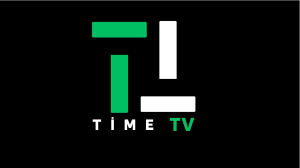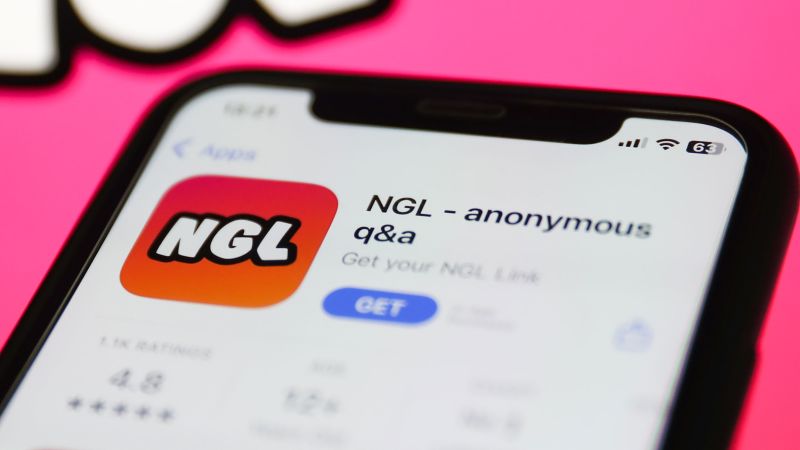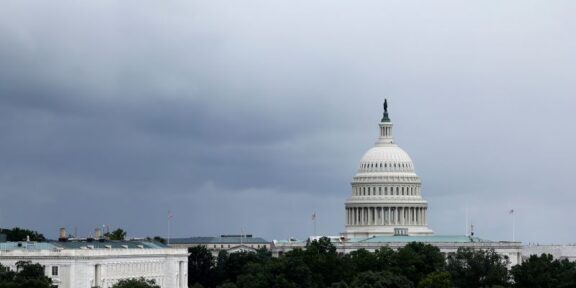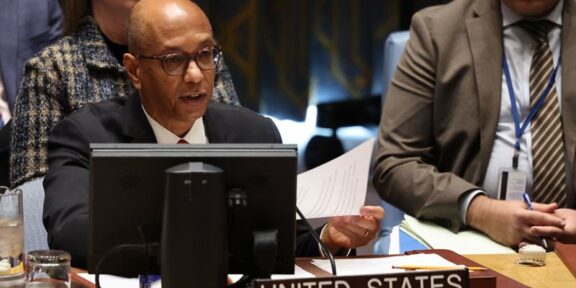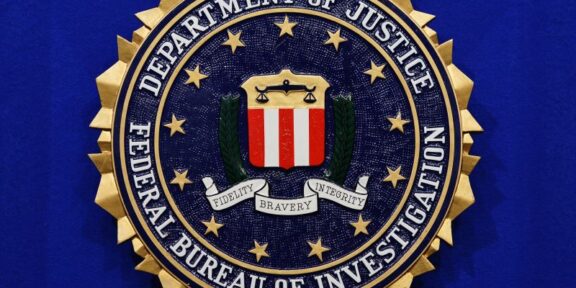Washington
“Time TV”
—
The Federal Commerce Fee and the Los Angeles District Lawyer’s Workplace have banned a controversial nameless messaging app from serving children below 18, taking an unprecedented and aggressive step towards what regulators referred to as “rampant cyberbullying and threats towards youngsters and youths” on the platform.
The focused ban is the FTC’s newest transfer in a wider crackdown on social media firms, knowledge brokers and different companies that allegedly mishandle client knowledge or make overhyped claims about synthetic intelligence.
As a part of a lawsuit and settlement introduced Tuesday, the app being penalized — often called NGL — can even pay $5 million to settle what FTC Chair Lina Khan mentioned was “reckless disregard for teenagers’ security.” The app can even must implement an age gate to dam its providers to present and new customers who’re below 18 years outdated. The regulators wrote that the app billed itself as a “protected area” for teenagers however, in actuality, preyed on them.
Along with highlighting FTC follow-through on earlier guarantees to police AI hype, the lawsuit immediately names the corporate’s co-founders, reflecting current company commitments to holding particular person executives accountable for company wrongdoing.
The app, often called NGL, had been downloaded tens of millions of instances, based on the grievance. NGL is an web abbreviation for “not gonna lie.”
NGL actively marketed itself to younger customers and violated federal legal guidelines geared toward defending youngsters’s knowledge, the lawsuit claimed, whereas its workers allegedly mocked paying customers as “suckers” whereas taking advantage of their ignorance.
In a press release, NGL co-founder Joao Figueiredo mentioned the corporate had spent almost two years cooperating with the FTC’s investigation however that it disputes the company’s findings, which had been permitted unanimously by the five-member fee.
“We view this decision as a chance to make NGL higher than ever for our customers and we expect the settlement is in our greatest curiosity,” Figueiredo mentioned. “Whereas we imagine most of the allegations across the youth of our consumer base are factually incorrect, we anticipate that the agreed upon age-gating and different procedures will now present course for others in our area, and hopefully enhance insurance policies typically.”
The settlement should nonetheless be permitted by the US District Court docket for the Central District of California earlier than taking impact.
NGL deceptively hooked teenagers into subscribing to its premium service by sending them faux, nameless messages after which promising to disclose the sender after they paid, mentioned the grievance.
The pc-generated messages had been purposely written to prey on teenagers’ social anxieties or aspirations, the lawsuit mentioned, citing examples akin to “I do know what you probably did” and “I’ve had a crush on you for years.”
NGL created greater than 1,000 completely different such messages posing as actual customers and despatched them tens of millions of instances to influence teenagers to pay to see who despatched them, the grievance mentioned. However when customers paid for details about each the faux and the actual messages, generally as a lot as $9.99 every week, the app didn’t present the sender’s identify however as an alternative offered “hints” such because the consumer’s tough location or the kind of gadget getting used, based on the lawsuit.
The messages began being despatched in 2022, a 12 months after the app’s lackluster launch, the grievance mentioned. After customers started suspecting the faux messages, many wrote detrimental critiques of the app and a few even referred to as it a rip-off, based on the lawsuit.
NGL had allegedly boasted in its advertising that the app was a “protected area for teenagers” and that it used AI-based content material moderation to guard customers. Behind the scenes, nevertheless, the app’s co-founders allegedly ignored or denigrated customers who complained, with Figueiredo responding “lol” in an inner message to a report about one upset buyer, based on the lawsuit.
The lawsuit and settlement are one other instance of how Khan, a vocal critic of the tech trade, has made regulating digital knowledge a trademark of her tenure.
Along with warning that generative synthetic intelligence could “turbocharge” fraud and scams, Khan has proposed a number of rules that might clamp down on how companies could accumulate, use and share client knowledge. One would crack down on what she calls a “business surveillance” trade, whereas one other seeks to broaden the FTC’s enforcement of a landmark youngsters’s privateness regulation.
The FTC can also be at present looking for to ban Meta from monetizing youngsters’s knowledge, a transfer that firm has challenged in courtroom. In 2022, the FTC compelled Epic Video games, maker of the hit online game “Fortnite,” to pay $520 million to settle allegations that it used sneaky user-interface methods often called “darkish patterns” to dupe customers into making in-game purchases.
The FTC transfer comes towards the backdrop of a flurry of state laws looking for to restrict younger individuals’s entry to social media. In one other first this 12 months, New York permitted laws that regulates the algorithms powering social media feeds on Fb, Instagram, TikTok and different apps. States akin to Arkansas, Florida, Louisiana and plenty of others have additionally handed legal guidelines clamping down on social media firms’ method to teenagers. Opponents, nevertheless, say the legal guidelines violate the First Modification rights of teenagers and the Supreme Court docket has agreed to think about the constitutionality of age-based web site restrictions in its subsequent time period.
Highlighting the groundbreaking nature of the NGL settlement, FTC Commissioner Andrew Ferguson described Tuesday’s motion as a “novel” use of the company’s authorized powers. For the primary time, he mentioned in a press release, the FTC claimed that NGL broke the regulation “by advertising an nameless messaging app to youngsters and youngsters regardless of figuring out that nameless messaging apps are dangerous to those teams.”
“This alleged conduct, tailormade to control the weak teenage psyche, was reprehensible and unfair,” Ferguson mentioned. However, he argued, the general public mustn’t interpret the lawsuit to imply that it’s unlawful generally to market any nameless messaging app to teenagers.
On Tuesday, the FTC credited the buyer advocacy group Fairplay and the social media critic Kristen Bride for “invaluable help” on the NGL investigation. Final 12 months, Bride testified earlier than Congress in a high-profile listening to about social media’s dangers for teenagers, recounting how her teenage son Carson died by suicide in 2020 after receiving a barrage of nameless cyberbullying messages. In October, Bride and Fairplay wrote to the FTC calling for an company investigation into NGL and accusing it of unfair and misleading enterprise practices in violation of federal regulation.
In a press release Tuesday, Bride applauded the lawsuit and settlement.
“This harmful enterprise mannequin retains children engaged whereas struggling to establish their unknown harassers in order that these firms can revenue from extra knowledge assortment,” Bride mentioned. “It’s unconscionable that NGL wouldn’t solely cost weak teenagers for ineffective hints as to who was messaging them however that the builders themselves had been sending harassing messages to teenagers and joking about it as mother and father expressed cyberbullying issues.”
